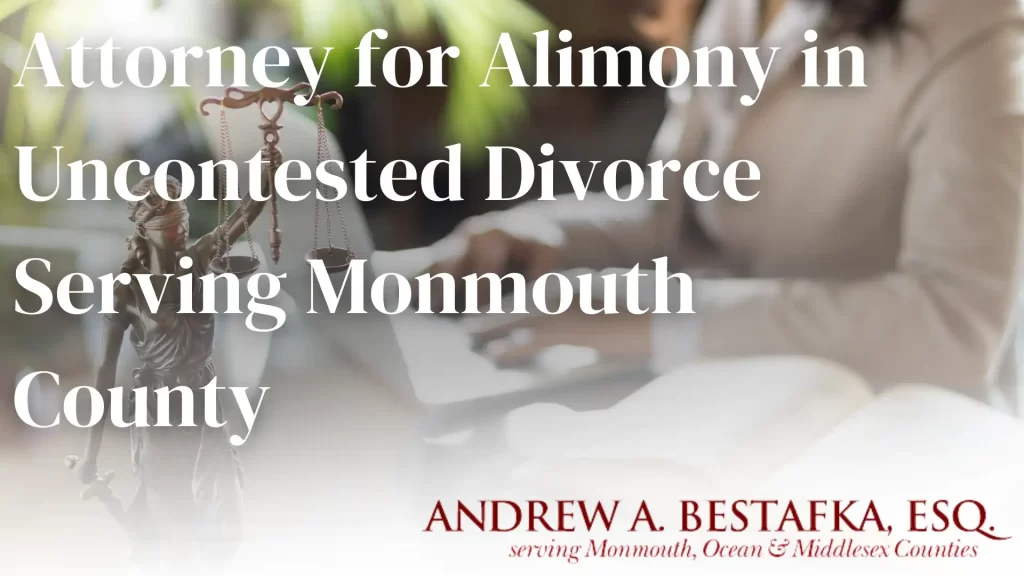
Ending a marriage can be an emotionally difficult period in a person’s life. However, that doesn’t mean that a divorce must be contentious or bitter. Some people eventually grow apart and find themselves incompatible with their current partner. When this happens, an uncontested divorce may be the best option for all parties involved.

Yet, an uncontested divorce doesn’t always mean there will be smooth sailing through the entire process. It may still be challenging to compromise with a partner over child custody, child support, and alimony payments.
At the offices of the Law Office of Andrew A. Bestafka, Esq., our Monmouth County uncontested divorce lawyer will review your situation and help you navigate the process of reaching a fair alimony agreement. We are committed to supporting you and addressing your needs during this mentally taxing time. For a confidential case evaluation, contact our New Jersey office today by calling (732) 898-2378 or filling out our online contact form.
What Is an Uncontested Divorce?
It can be hard to see eye to eye with a soon-to-be ex-partner. However, not all divorces are contentious battles. There are times when partners agree that it is time to move on, and they agree on the basic tenants of their separation. When this is the case, an uncontested divorce may be a good option.
An uncontested divorce is a no-fault divorce. To qualify for an uncontested divorce, generally, both partners must agree about:
- The equitable division of marital assets
- Child custody arrangements
- Alimony
For an uncontested divorce, couples must also agree on the legal reason for the divorce. Often, irreconcilable differences are the grounds cited in this type of divorce. Additionally, you or your spouse must be a legal resident of New Jersey for at least one year before filing for divorce.
Are You Entitled to Alimony?
 Alimony is not gender specific. It is a court-ordered financial payment that is supposed to address one partner’s change in financial status or living situation. Either spouse may be ordered to make alimony payments. Factors that may impact whether alimony is ordered and from which partner include:
Alimony is not gender specific. It is a court-ordered financial payment that is supposed to address one partner’s change in financial status or living situation. Either spouse may be ordered to make alimony payments. Factors that may impact whether alimony is ordered and from which partner include:
- Financial need
- Duration of the marriage
- Age, physical, and emotional health of both partners
- Standard of living within the marriage
- Earning capacity of each spouse
- Whether a spouse has been absent from the job market
- Time and expense needed to gain sufficient training to enter the workforce
- Parental responsibilities
- History of financial and non-financial contributions to the marriage
- Potential tax consequences
- Distribution or marital property
In 2014, New Jersey overhauled its alimony system and eliminated permanent alimony payments. A spouse could no longer count on indefinite alimony payments. Instead, a new category of alimony was created: “open durational alimony.” This type of alimony is available for people who were married for 20 years or longer. The alimony may be discontinued when it is no longer needed or when the payor retires. “Limited duration alimony” allows alimony for a specific period of time that does not exceed the length of the marriage. This type of alimony is for couples married for less than 20 years.
In rare circumstances, New Jersey courts will agree to extend the length of alimony payments, but only in exceptional circumstances such as:
- If a spouse has a chronic illness
- If one spouse received a significantly bigger portion of the marital assets
- A spouse’s inability to become self-supporting
- Other relevant factors, as determined by a judge
Alimony payments will be discontinued when the partner receiving the benefits begins cohabitating with another person.
Calculating Alimony Payments
Unlike child support, New Jersey does not have a specific formula for calculating alimony payments. In cases where a judge is determining the amount of alimony payment, considerations are made for the differences between the partner’s income levels and each partner’s self-supporting abilities. The goal of alimony is to account for income disparities and preserve the lifestyle each spouse grew accustomed to during their marriage.
During an uncontested divorce, you and your partner need to have a frank discussion about finances and each partner’s expectations. In some cases, mediation may be a vital tool for fostering better communication and helping you and your partner reach an amicable alimony arrangement.
It is valuable to keep in mind that alimony agreements can be modified when a spouse’s circumstances change. Impending retirement, the loss of income, or a change in a partner’s employment status may necessitate a revision to your original alimony agreement.
Why You Need an Attorney
An uncontested divorce may be more amicable than a contested divorce. However, that doesn’t mean reaching an alimony agreement is always simple. You deserve an experienced divorce lawyer on your side, protecting your rights and helping you achieve a fair arrangement. One of the most common mistakes couples make is thinking an uncontested divorce can be easily accomplished without the assistance of a skilled attorney. Even if you and your spouse agree on every aspect of your separation, there is still legal paperwork to file and arrangements to be ironed out.
You and your spouse have been through a lot together. An attorney can be an advocate for you. They can be a neutral and compassionate third party who diligently works to ensure your divorce progresses as smoothly as possible.
At the Law Office of Andrew A. Bestafka, Esq., our legal team takes the time to get to know you and will build a legal strategy that addresses your needs and goals. With over a decade of legal experience, Andrew A. Bestafka, Esq., understands the intricacies of New Jersey law. He can help you navigate the divorce process, estimate the value of your marital assets, and negotiate an alimony arrangement on your behalf.
Contact a Monmouth County Divorce Attorney Today
Divorce can be a time-consuming and complicated process. You deserve to work with a Monmouth County uncontested divorce lawyer who will help you through the legal morass and support you emotionally from beginning to end. If you have questions about reaching an alimony arrangement in an uncontested divorce, reach out to the Law Office of Andrew A. Bestafka, Esq. for help. Our goal is to help you achieve a favorable resolution to your case.
For a confidential consultation to discuss the details of your alimony case, call our Monmouth County office at (732) 898-2378. Protect yourself and your financial future. Call the Law Office of Andrew A. Bestafka, Esq. today.
